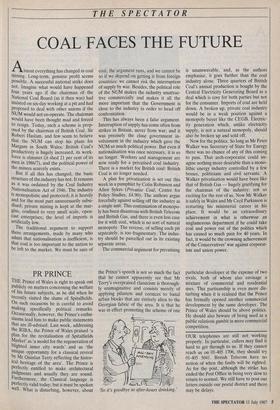PR PRINCE
HE Prince of Wales is right to speak out Publicly on matters concerning the welfare of his future subjects, as he did when he recently visited the slums of Spitalfields. On such occasions he is careful to avoid making specifically political remarks. Occasionally, however, the Prince's enthu- siasms lead him to make public statements that are ill-advised. Last week, addressing the RIBA, the Prince of Wales praised 'a plan for the revitalisation of Spitalfields Market' as 'a model for the regeneration of blighted inner city wards' and as 'the unique opportunity for a classical revival by Mr Quinlan Terry reflecting the histor- ical heritage of the area'. The Prince is Perfectly entitled to make architectural judgments and usually they are sound. Furthermore, the Classical language is Perfectly valid today; but it must be spoken well. What is disturbing, however, about the Prince's speech is not so much the fact that he cannot apparently see that Mr Terry's overpraised classicism is thorough- ly unimaginative and consists merely of applying pilasters and cornices to banal urban blocks that are entirely alien to the Georgian fabric of the area. It is that he was in effect promoting the scheme of one 'So it's goodbye to after-hours drinking.' particular developer at the expense of two rivals, both of whom also envisage a mixture of commercial and residential uses. This partisanship is even more dis- turbing when it is realised that the Prince has formally opened another commercial development by the same developer. The Prince of Wales should be above politics. He should also beware of being used as a public relations gambit in mere commercial competition.


















































 Previous page
Previous page